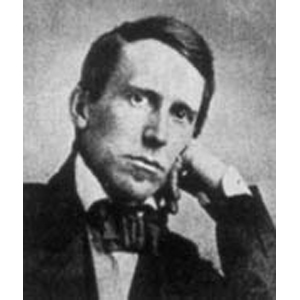« Back to Composer Index
Stephen Collins Foster
Info
07/04/1826
Lawrenceville, Pennsylvania
01/13/1864
New York City, New York
USA
Romantic
Vocal, Folk
Lawrenceville, Pennsylvania
01/13/1864
New York City, New York
USA
Romantic
Vocal, Folk
Biography
Stephen Foster was born on July 4, 1826 at his family's home, the White Cottage, in Lawrenceville, PA, one of 10 children. Early in his life, Stephen showed both an interest in and a talent for music. He was raised before the times of affordable public schools, so his education consisted mostly of private tutors and academies. It is believed that he was able to receive some formal training from Henry Kleber, a musician and teacher who would later become a major influence in Pittsburgh. Foster quickly became interested in a growing form of popular musical entertainment style; theminstrelsy. He began writing down all his song ideas in a thick sketchbook. Contrary to a popular belief, he did not write perfect songs the first time, nor did he come up with an entire composition with each new idea. Foster was a perfectionist, one who would completely redo a verse of lyrics if he felt a comma was out of place. Open Thy Lattice Love was Foster's first published work at age 18. At age 20, when he went to Cincinnati to work for his brother as a bookkeeper for his brother, Foster sold 12 songs to a local music publisher. Many of these songs, including the hit Oh! Susanna quickly became popular. However, they netted Foster almost no money at all. This experience taught Foster that his musical talents could be worth a lot of money, but he would have to be more careful in the future about selling his intellectual property.
In 1850, Foster married Jane Denny McDowell. Their daughter, Marion, was born one year later. Foster and his new wife spent the next several years moving between New York and Pittsburgh, living in various boarding houses. Throughout his entire career, Foster had problems financially. This was due to the laws of the 19th century regarding copyrights and intellectual property. Virtually no copyright law existed, and very few lawyers specialized in the laws that did. As a result, Foster had no way to keep other people from taking and rearranging his music, or to enforce the law upon the people who simply pirated his pieces. Most of Foster's income would come from royalties from publishing sheet music. The 1850s saw Foster's most popular works published. Foster had two goals during this time: to raise the standards of the minstrelsy style, making it acceptable to those in the "higher" circles, and to make as much money as he could while doing so. To accomplish this, he eliminated offensive words from his music, and attempted to portray African-Americans as people, rather than lower-class property. (The last can be best seen in Nelly Was a Lady). While his work still never pulled in much money, it was a success with the public. Ironically, Foster himself would never become widely known, as he performed his pieces as other musicians did. In 1854, Foster experimented with a musical style that was popular among the wealthy and those he considered with good taste; parlor music. The Social Orchestra was published in 1854, a composition of over 70 arrangements of music for various classical instruments, in the styles of Mozart, Schubert, and other famous composers. As with his other works, it was popular with the public but still a financial flop.
The end of the 1850s saw a decline in Foster's personal life, which led to a decline in his music and fortune. He went into a depression after separating from his wife and learning of his parents' death. His expenses remained however, forcing him to borrow heavily. Due also to the Civil War and unstable economy, Foster had great difficulty finding musical contracts. On January 13, 1864, Foster died at Bellevue Hospital in New York, penniless and still virtually unknown personally to the public.
Main Works
Folk Songs:
Open Thy Lattice Love
Nelly Was a Lady
My Old Kentucky Home
Jeanie With the Light Brown Hair
Beautiful Dreamer
Old Folks at Home
Minstrel Songs:
Oh! Susanna
Camptown Races


